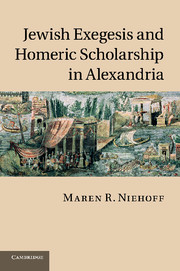Book contents
- Frontmatter
- Contents
- Acknowledgements
- List of abbreviations
- 1 Setting the stage
- Part I Early Jewish responses to Homeric scholarship
- Part II Critical Homeric scholarship in the fragments of Philo's anonymous colleagues
- Part III The inversion of Homeric scholarship by Philo
- 8 Literal methods of Homeric scholarship in Philo's Allegorical Commentary
- 9 Philo's Questions and Answers as a manual of instruction
- 10 Philo's Exposition of the Law at a significant distance from Alexandrian scholarship
- Epilogue
- References
- Index of Greek terms
- Index of sources
- Index of modern authors
- General index
10 - Philo's Exposition of the Law at a significant distance from Alexandrian scholarship
Published online by Cambridge University Press: 03 May 2011
- Frontmatter
- Contents
- Acknowledgements
- List of abbreviations
- 1 Setting the stage
- Part I Early Jewish responses to Homeric scholarship
- Part II Critical Homeric scholarship in the fragments of Philo's anonymous colleagues
- Part III The inversion of Homeric scholarship by Philo
- 8 Literal methods of Homeric scholarship in Philo's Allegorical Commentary
- 9 Philo's Questions and Answers as a manual of instruction
- 10 Philo's Exposition of the Law at a significant distance from Alexandrian scholarship
- Epilogue
- References
- Index of Greek terms
- Index of sources
- Index of modern authors
- General index
Summary
The last series of Philo' exegetical writings that we shall analyse in this book is the Exposition of the Law, which is generally recognized as belonging to a different genre from the Allegorical Commentary and the Q&A. Abraham Terian and David Runia rightly stressed this difference, insisting that Philo's treatise On the Creation belongs together with the Lives of the Patriarchs and should not have appeared in the English translation of his works before the three books of Allegorical Commentary on the creation. The structure of the Exposition was appreciated by the modern Hebrew translators of Philo's works, who published its different treatises in their proper order. The Hebrew reader of Philo thus moves from the Creation directly to the Lives of the Patriarchs and from there to the Decalogue and On the Special Laws. In this way Philo's argument about the law of Nature, which unfolds in these different aspects of the Jewish religion, is easily recognized as a prominent theme of the series.
The Exposition no longer follows the conventions of a running commentary, offering instead a broad paraphrase or summary of the biblical material. Leopold Cohn and Louis Massebieau have explained this feature by reference to the particular audience of this series. In their view, Philo addressed a wider Jewish audience in Alexandria than he had previously envisioned in the Allegorical Commentary and the Q&A, while not yet reaching out to an even broader non-Jewish audience, as he subsequently did in his apologetic and historical works.
- Type
- Chapter
- Information
- Jewish Exegesis and Homeric Scholarship in Alexandria , pp. 169 - 185Publisher: Cambridge University PressPrint publication year: 2011



